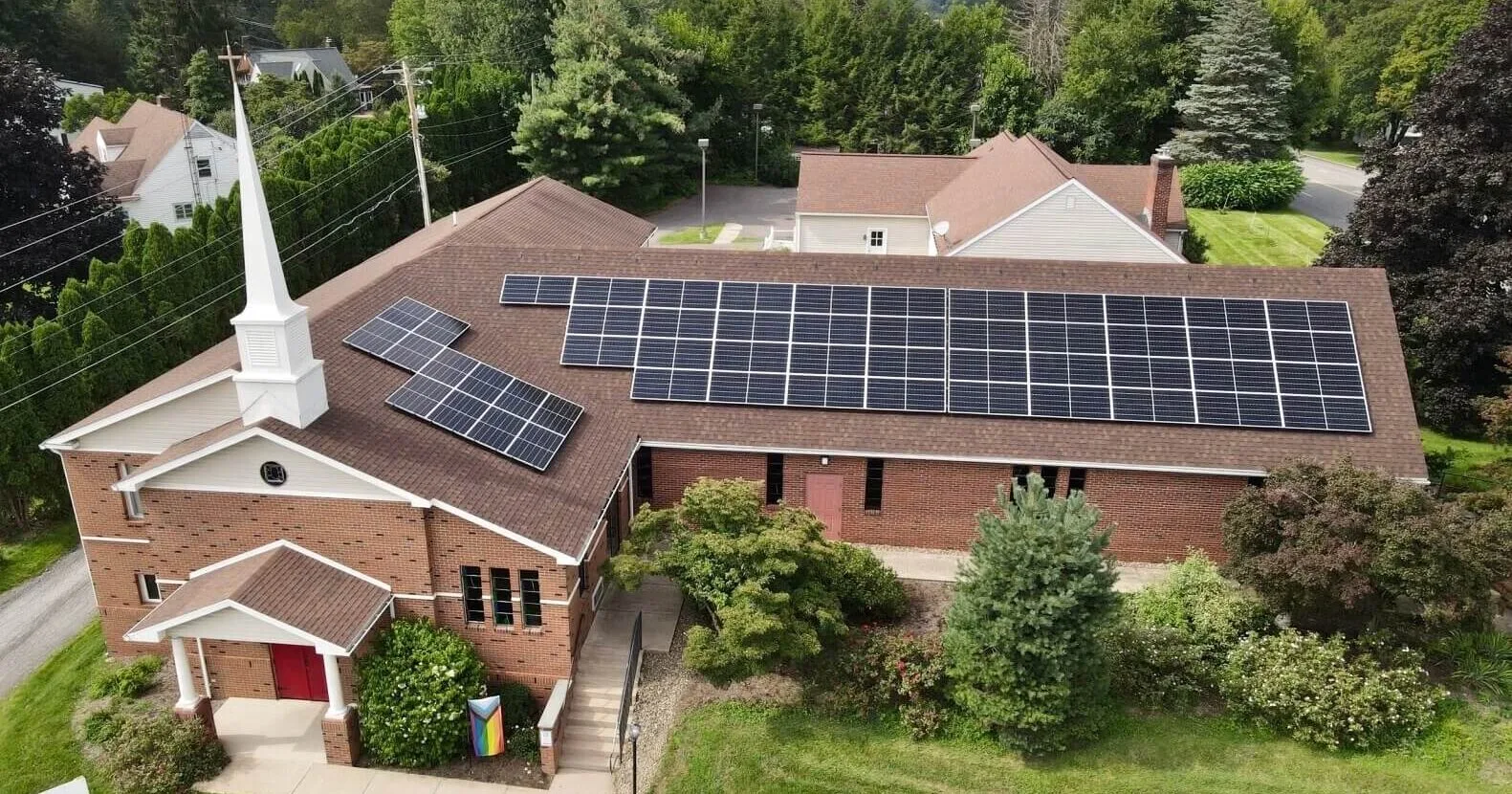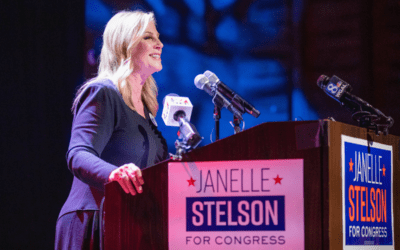
Ariel photo of St. Andrew's Episcopal Church courtesy of Envinity.
President Biden’s Inflation Reduction Act allows churches and other tax exempt entities the opportunity to obtain clean energy tax credits and lower the cost of installing solar panels.
St. Andrew’s Episcopal Church in Lewisburg, Pennsylvania is looking at renewable energy to help their church keep the lights on, serve their community, and act as stewards for the local environment.
Recent changes to solar tax credits through President Biden’s Inflation Reduction Act will help the rural church hit all three of their goals.
“Our church has had a long history of two things,” said Maggie Chappen, the senior warden at St. Andrews Church.
“We’ve had a history of environmental stewardship as part of our outlook religiously in theology. And we also do a lot of community outreach.”
As part of its environmental efforts, the church helps with cleaning trash off the local highways and hosts rain barrel workshops, which provide residents with the resources to store excess rain water for home gardens. The church also operates a diaper bank and also supports a local homeless shelter and the local food bank.
In order to cover their overhead costs and lower utility bills, the church installed 54 solar panels on the building’s roof. The money saved from this conversion will help the church to continue to fulfill their environmental and community missions.
“We were approaching the idea of solar panels from three points of view: financial, certainly environmental, and also inspirational because we’re located right on the edge of a very busy highway,” Chappen said.
Prior to the passage of the Inflation Reduction Act, churches such as St. Andrews were unable to take advantage of tax credits to help install solar panels, but now the church is expecting to save $20,000 from the tax credits.
According to the Environmental and Energy Study Institute, thanks to the Inflation Reduction Act, tax exempt entities like St. Andrews are now able to take advantage of clean energy tax credits through the direct pay option, which allows qualifying entities to receive a direct payment from the Internal Revenue Service (IRS).
“In the old days before the Inflation Reduction Act, nonprofits really couldn’t access any kind of federal funding for those projects because we don’t pay taxes, and the rebates were paid as tax credits or tax rebates,” Chappen explained.
“So now with the Inflation Reduction Act, we could apply for tax credits, which we think will be about $20,000,” she said. “And because we’re a nonprofit, we can continue to apply for grant money, which we’re still doing. So it opened up a double stream of revenue to allow this process to go forward.”
The project cost the church $80,000 up front, but Chappen said they have a donor willing to cover the cost of the project. The donor hopes to be repaid through the federal rebate and other grants or solar renewable energy certificates.
It will cost $65,000 to install the solar panels and an additional $15,000 to make repairs to their roof.
Thanks to the Inflation Reduction Act, St. Andrew’s will be able to collect $20,000 in tax credits, essentially saving 30% of the costs for installing the solar panels. That $20,000 will then go back to the donor. Once the panels are installed, the church will be able to save $4,000 a year between their electric bill and credits for producing electricity.
“We see this project as a way to accomplish several goals at the same time,” Chappen said.
“It will do good things for creation, it will help our bottom line and allow us to continue outreach, and hopefully it will inspire others to do the same.”
Support Our Cause
Thank you for taking the time to read our work. Before you go, we hope you'll consider supporting our values-driven journalism, which has always strived to make clear what's really at stake for Pennsylvanians and our future.
Since day one, our goal here at The Keystone has always been to empower people across the commonwealth with fact-based news and information. We believe that when people are armed with knowledge about what's happening in their local, state, and federal governments—including who is working on their behalf and who is actively trying to block efforts aimed at improving the daily lives of Pennsylvania families—they will be inspired to become civically engaged.


For Rep. Susan Wild, supporting PA families includes reproductive rights and much more
Rep. Susan Wild wants to be very clear with Pennsylvanians: Donald Trump is committed to taking away women’s reproductive freedom, but he is not...

School districts working with anti-LGBTQ groups can cost your kids’ schools millions
Parents across South Central Pennsylvania are worried about the potential financial impacts working with anti-LGBTQ groups may have on their school...

VIDEO: Trump distances himself from his anti-abortion views
Donald Trump appeared on WGAL on Tuesday and continued to distance himself from his anti-abortion views claiming that reproductive rights are now a...

VIDEO: Community pushback gets school board to rescind decision on denying gay actor’s visit
Cumberland Valley School Board offered a public apology and voted to reinstate Maulik Pancholy as a guest speaker a week after the board voted to...

VIDEO: Project 2025 brings nuclear armageddon back into vogue
Project 2025 is a titanic document, with plans ranging from cutting half of all government employees to targeting reproductive rights on a scale...





